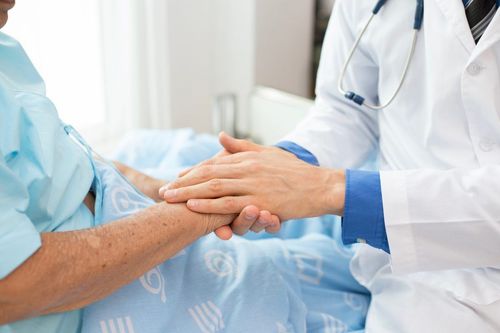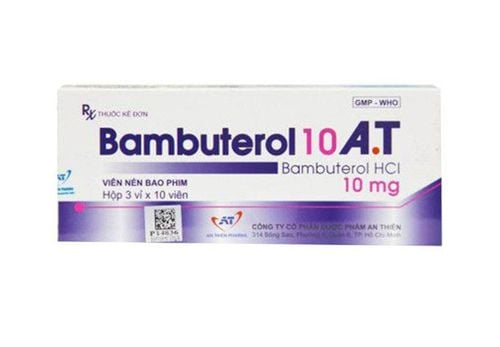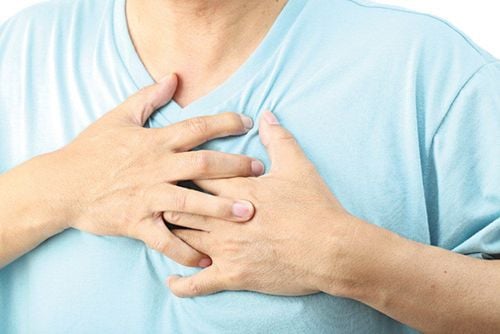This is an automatically translated article.
The article is professionally consulted by Specialist Doctor I Tran Quoc Vinh - Emergency Doctor - Department of Resuscitation - Emergency - Vinmec Nha Trang International General Hospital.Palpitations are not usually a serious health problem if they do not occur frequently. However, frequent palpitations of the heart can be an alarm symptom of some heart disease that needs to be checked soon.
1. Overview of heart activity
The heart is a muscular block, with two upper chambers, the right atrium and the left atrium, and the two lower chambers, the right ventricle and the left ventricle, which pump blood throughout the body. The pumping action of the chambers of the heart is coordinated with each other to ensure a constant amount of blood is pumped throughout the body. When cells need more oxygen, for example during exercise, the heart beats faster to pump more blood to the lungs and cells. An electrical impulse is emitted in the right atrium, which will be transmitted through the left atrium, down the right ventricle and left ventricle, stimulating the heart chambers to contract and pump blood to the body.2. What is suspense?
Palpitations are the feeling of the heart beating fast, fluttering, palpitations that the patient feels in the left chest. This symptom is usually caused by a faster heart rate with a normal heart rate for your age, gender, and health condition. Palpitations can be caused by an abnormally fast but steady heart rate, extrasystoles, or an irregular heartbeat.3. Heart palpitations, trembling hands - warning symptoms of heart disease
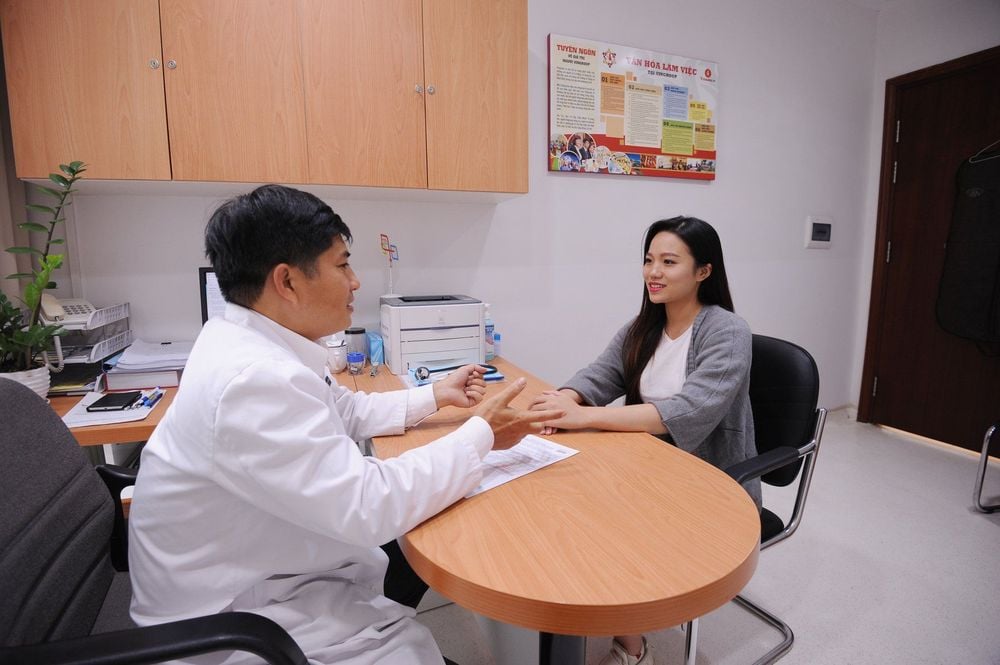
Occurs often: Heart palpitations, palpitations, and palpitations. may appear occasionally or several times a day, each lasting a few minutes. If this symptom occurs frequently, the patient should seek medical attention. If this happens only occasionally, it may be due to less serious causes such as anxiety, stress, drinking too much coffee, drinking alcohol or the effects of pregnancy; Heart palpitations throbbing: If the heart palpitations are accompanied by chest pain, the patient needs immediate emergency care because this is a symptom that the heart is having a serious problem; Shortness of breath: Patients should see a doctor if their heart palpitations are accompanied by symptoms of shortness of breath. If the patient has difficulty breathing, faints, it needs to be treated immediately; Dizziness, leg swelling: When accompanied by heart palpitations, dizziness, leg swelling is a sign that the heart is having a serious problem.
4. Causes of nervousness due to heart disease
Here are the most common causes of palpitations, heart palpitations due to cardiovascular disease:4.1 Sinus tachycardia (fast, regular rhythm) Normally, the heart rate beats about 70 times/minute, fluctuating in adults. into 60-100 times/minute. A normal resting heart rate will depend on a person's age and health status (the stronger the person, the slower the pulse). Heart rate often increases when:
Exercise, anxiety; Use of coffee, alcohol and stimulants such as cocaine; Using some over-the-counter cough and cold medicines and some prescription medications, such as salbutamol, for asthma; Hyperthyroidism; An underlying serious disease of the heart. When experiencing this symptom, the doctor will ask the patient's medical history, the circumstances of the palpitations, then take the pulse, measure the blood pressure, listen to the heart and do some tests. Treatment will depend on the cause of the palpitations.
4.2 Extrasystoles (ectopic or lost rhythms) Extrasystoles occur when the myocardium emits an electrical impulse in addition to the normal rhythmic impulse, causing the heart muscle to contract. After an extrasystole, the heart will rest longer than usual, so the patient feels like the rhythm is lost. The usually harmless extrasystoles tend to appear at rest and disappear with exertion. However, ventricular extrasystoles are rhythms that originate in the myocytes of the ventricles, if the frequency is low, no treatment is needed, but if the frequency is thick, there is a risk of conversion to ventricular tachycardia and fibrillation. This is a life-threatening condition. The diagnosis is made of extrasystoles on an electrocardiogram (ECG). Most cases of palpitations due to extrasystoles do not require specific treatment.
4.3 Irregular Heart Rate The palpitations can be caused by an irregular heartbeat, irregular heartbeat. The main cause of this condition is abnormal electrical activity in the atria or ventricles. In particular, abnormal heart rhythms emanating from the ventricles are less common but more dangerous than irregular rhythms originating from the atria. The most common types of arrhythmias are:
Atrial fibrillation: Causes an irregular heartbeat, usually tachycardia. The disease is more common in the elderly, with high blood pressure and underlying cardiovascular disease. In addition, drinking too much alcohol and having hyperthyroidism are also causes of atrial fibrillation. Atrial fibrillation can lead to the formation of blood clots, which, if moved to the brain, can block a blood vessel in the brain. Therefore, atrial fibrillation is also a common cause of ischemic stroke. When detecting an irregular heartbeat, the doctor will assign the patient to take an electrocardiogram to diagnose the disease. Treatment includes medications that slow the heart rate (such as bisoprolol), drugs that restore sinus rhythm (such as flecainide), and anticoagulants to prevent stroke (such as warfarin). Other therapeutic measures include cardioversion to restore sinus rhythm, electrocautery to destroy the arrhythmogenic myocardium, and implantation of a pacemaker to take over control of the heart rate; Supraventricular tachycardia: The heart will beat very fast, then stop or beat tight. Supraventricular tachycardia occurs when abnormal electrical impulses originating in the atria override the normal impulse system of the heart, the source of this high-frequency pulse is usually located in the tricuspid valve region, near the heart. adjacent to the atrioventricular node of the heart, acting by the mechanism of re-entry of the atrioventricular node. The disease often has no known cause. In some cases, the onset of tachycardia is observed during strenuous activity, emotions, or when drinking alcohol or coffee. Supraventricular tachycardia is common for the first time in young people, most cases are harmless and do not require treatment. However, if the intensity is too much, it can lead to heart failure, because tachycardia increases myocardial oxygen demand, too fast can also cause hypotension and cardiogenic shock. When the disease causes discomfort, the patient may be prescribed beta-blockers such as bisoprolol to slow the heart rate or radically treat with electrocautery; Ventricular Arrhythmias: Less common but more dangerous than atrial arrhythmias such as atrial fibrillation or supraventricular tachycardia. Diagnosis is usually made through an electrocardiogram. Patients with ventricular arrhythmias need to see a cardiologist for appropriate and effective treatment.
5. Diagnosis and treatment of palpitations and palpitations
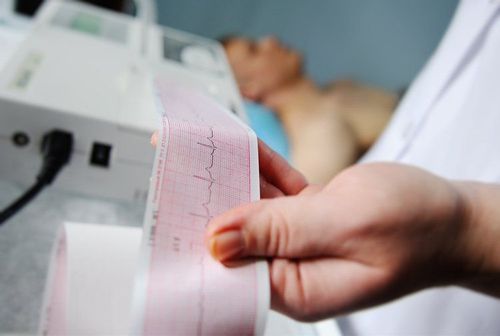
Blood tests : To rule out palpitations and palpitations due to anemia or hyperthyroidism; Electrocardiogram: Records the electrical activity of the heart, helping to diagnose existing or potential heart conditions. A 24-hour electrocardiogram records the electrical activity of the heart continuously for 24 hours. The patient is asked to measure the electrocardiogram while palpitating; Some other tests will be ordered to perform on a case-by-case basis. 5.2 Treatment
Treatment of palpitations will depend on the cause of the palpitations. Specifically:
Do not stay up too late; Do not use stimulants such as drinking alcohol, smoking, drinking solid tea, coffee; Rest in quiet places; Avoid being overly emotional or nervous; Eat lots of fresh vegetables; Practice sports with useful subjects such as walking, swimming, tai chi; Follow the doctor's instructions exactly when using the drug. When there are signs of palpitations, heart palpitations, it is best for patients to see a cardiologist as soon as possible to get an accurate diagnosis of their health problems and to have effective treatment and avoid complications.
With a team of leading, experienced and highly specialized doctors, the world's most advanced equipment system and comprehensive professional cooperation with the most prestigious hospitals in Vietnam and other countries. development: Singapore, USA, Japan... Vinmec International General Hospital is a reliable and perfect address to take care of your heart health, so that you can live a happy and healthy life with peace of mind.
Doctor Tran Quoc Vinh has more than 6 years of working experience (starting in 2011) in the field of Emergency Medicine, he used to work at the Emergency Department of Khanh Hoa Provincial General Hospital, participated in medical examination and treatment. for many clinics in Nha Trang area before becoming a doctor of emergency department at Vinmec Nha Trang International General Hospital as it is today.
Please dial HOTLINE for more information or register for an appointment HERE. Download MyVinmec app to make appointments faster and to manage your bookings easily.





